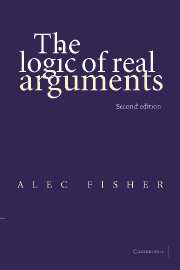Book contents
- Frontmatter
- Contents
- Preface to the first edition
- Preface to the second edition
- Acknowledgements
- 1 Introduction
- 2 A general method of argument analysis
- 3 A first example – from Thomas Malthus
- 4 Reasoning about nuclear deterrence
- 5 An example from John Stuart Mill
- 6 Arguments about God's existence
- 7 How do your mind and body interact?
- 8 Suppose for the sake of argument that …
- 9 An example from Karl Marx
- 10 Evaluating ‘scientific’ arguments. Some initial examples
- 11 Philosophical assumptions
- Appendix: Elementary formal logic
- Exercises
- Bibliography
- List of further reading
- Index
9 - An example from Karl Marx
Published online by Cambridge University Press: 05 June 2012
- Frontmatter
- Contents
- Preface to the first edition
- Preface to the second edition
- Acknowledgements
- 1 Introduction
- 2 A general method of argument analysis
- 3 A first example – from Thomas Malthus
- 4 Reasoning about nuclear deterrence
- 5 An example from John Stuart Mill
- 6 Arguments about God's existence
- 7 How do your mind and body interact?
- 8 Suppose for the sake of argument that …
- 9 An example from Karl Marx
- 10 Evaluating ‘scientific’ arguments. Some initial examples
- 11 Philosophical assumptions
- Appendix: Elementary formal logic
- Exercises
- Bibliography
- List of further reading
- Index
Summary
In this chapter we apply the method we have outlined so far to a real and quite complicated example due to Karl Marx. The reader should first read the passage through and should then attempt to answer the questions which immediately follow it. Unless one does this it is easy to underestimate the difficulties in Marx's argument.
Those readers who can answer the questions without recourse to the method we have outlined need read no further, but we hope that others will find that the method enables them to answer questions which otherwise defeated them.
Karl Marx: Value, Price and Profit
Karl Marx was born in 1818, the son of a lawyer. He studied at the universities of Bonn and Berlin before embarking on a life of journalism and political activism. He was expelled from Prussia in 1849 having been acquitted of high treason. He settled in London where he spent the rest of his life, often in real poverty. He died in 1883 and is buried in Highgate cemetery in North London.
His major work, Das Kapital, makes very hard reading, but our extract comes from his Value, Price and Profit, which gives a much simpler statement of his ideas. It was originally delivered as a paper to an international congress of working men in 1865. At that time there was ‘on the continent a real epidemic of strikes, and a general clamour for a rise of wages’, as Marx put it, and the question was whether working people could increase their wages by such activity.
- Type
- Chapter
- Information
- The Logic of Real Arguments , pp. 132 - 142Publisher: Cambridge University PressPrint publication year: 2004



